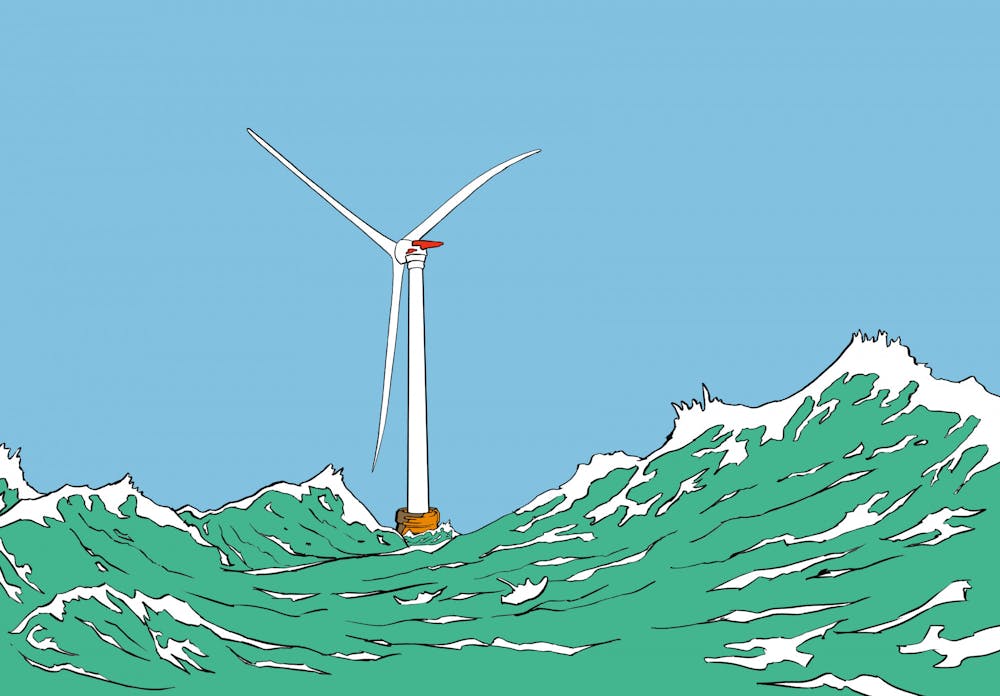The state of Rhode Island has collaborated with energy companies and the federal government to jumpstart the country’s transition from fossil fuels to clean energy produced by offshore wind farms.
Following the Biden administration’s decision to support and target wind energy proposals, new projects have been set into development across the Northeastern coast. Ørsted, a green energy-focused company, partnered in 2019 with Eversource in New England to drive much of the building of future sites. In addition to the already operational Virginia Offshore Wind Farm, Ørsted was also awarded the construction of three more projects along the New England coast: Revolution, South Fork and Sunrise Wind.
Rhode Island’s central role in the offshore wind power industry is also connected to Ørsted’s presence in the United States. Block Island Wind Farm, built in 2016 by Ørsted, was the first fully operational wind farm in the country and served to study the feasibility, challenges and possibilities of such an enterprise. Ørsted estimates that its projects under development in the Northeast “will generate enough energy to power one million homes in Rhode Island, Connecticut and New York annually,” Stacy Tingley, Ørsted’s deputy head of government affairs and market strategy, told The Herald.
Tingley added that the recent push toward clean energy in the Northeast was greatly impacted by Rhode Island’s leadership. “We are really fortunate in Rhode Island to have really great champions for offshore wind,” she said.
After taking office last year, Governor Daniel McKee signed the Act on Climate bill in April 2021 to set Rhode Island on a path towards achieving net-zero greenhouse gas emissions by 2050. Moreover, his fiscal year 2023 budget proposes more than $150 million to fund projects that target climate action and develop a green economy. Alana O’Hare, press secretary for Governor McKee, wrote in an email to The Herald that these investments will promote an economy conscious of ocean resources, or a blue economy, that can benefit an entire supply chain across the nation by creating jobs and meeting climate goals.
Rhode Island’s dense population, high demand for energy and long stretches of shallow waters make the state an ideal location for offshore wind farms, Tingley said. The state, therefore, has become a hub in the nation for green energy development. “We have the academic research and scientific expertise at the University of Rhode Island ensuring our developments co-exist with the natural ecosystems and those who work therein. We have one of the most ambitious timelines in the country for development, as well as our goal of meeting 100% of Rhode Island’s electricity demand with renewable energy by 2030,” wrote Brian Hodge, the deputy director of communications at Rhode Island Commerce, in an email to The Herald. Rhode Island Commerce is “a quasi-public agency” which offers economic development services to the state of Rhode Island, according to its website.
Hodge added that Rhode Island’s investment in renewable energy and more sustainably-powered economies has been vitally supported by the federal administration. “Rhode Island has been selected as a finalist with two applications in the Build Back Better Regional Challenge,” he wrote. “As a finalist, the state has received $500,000 for additional planning for each project and advances to the final round with available funding of up to $100 million.”
Despite having to go through extensive approval processes and promising advancements towards clean energy, projects face opposition from the fishing industry. Laura Dwyer, public educator and information coordinator of RI Coastal Resources Management Council, explained in an email to The Herald the complex mechanisms in place to guarantee the success of wind farms: “We evaluate things like whether a project will impact the state’s coastal resources, whether it will impact the state’s fishing industry/economic development, its cultural and historic resources, its marine transportation, navigation and infrastructure and its existing and future water-dependent uses.”
Still, Dwyer recognized the validity of the fishing industry concerns. “Wind farms do impact the fishing industry,” she wrote. “Construction of the turbine foundations and submerged cables, and their operation in the offshore area, can impact fishery operations by altering fishing methods and gear, navigational safety and displacement issues.”
Rhode Island has become a national leader in clean energy solutions. “Global need for electricity is only rising, and so are global calls for emission reductions and renewably sourced energy,” Hodge wrote. “Rhode Island and the U.S. government have ambitious green energy goals and wind energy is a key component to reaching those goals.”

Julia Vaz was the managing editor of newsroom and vice president on The Herald's 134th Editorial Board. Previously, she covered environment and crime & justice as a Metro editor. A concentrator in political science and modern culture and media, she loves watching Twilight (as a comedy) and casually dropping the fact she is from Brazil.





